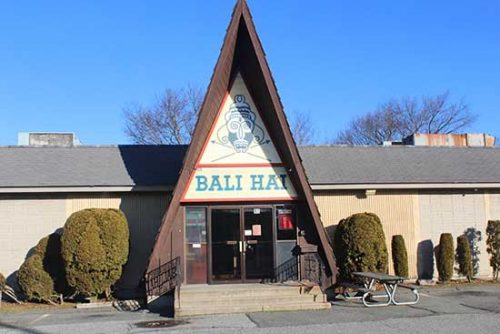Published January 9, 2019
By DAN TOMASELLO
LYNNFIELD — It’s the end of the line for another North Shore landmark.
The Bali Hai Restaurant closed its doors on New Year’s Eve after previously serving Chinese and Polynesian cuisine and drinks since the 1950s.
“We will be closing the restaurant after 40 plus years serving the Lynnfield community,” the restaurant’s owners, the Yee family, wrote on a note posted on the restaurant’s front door. “We’d like to thank all of our loyal customers who have come through these doors for so many years.”
In an interview with the Villager, attorney Ted Regnante said the Yee family sold the restaurant to local developers Matt and David Palumbo for $600,000.
In a Facebook post, Main Street resident and local attorney Jay Kimball wrote he was “sad” that the Bali Hai was closing.

THE BALI HAI RESTAURANT closed its doors on New Year’s Eve. The Chinese and Polynesian restaurant had been a town fixture since the 1950s. (Dan Tomasello Photos)
The Palumbo brothers proposed constructing a 23-unit apartment building on the property last summer, but the Zoning Board of Appeals rejected the project this past November. While ZBA members Anthony Moccia and Anders Youngren voted in favor of the developers’ request for a Special Permit, ZBA Chairman Brian Shaffer voted no. State law requires three-member ZBAs such as Lynnfield’s to unanimously approve requests for zoning relief such as Special Permits or variances.
“We have filed an appeal of the ZBA’s decision in the Land Court,” said Regnante. “It could take up two years. In the meantime, they are going to be making renovations to the property such as replacing some of the kitchen equipment.”
Regnante said the Palumbos will be looking to rent out the Moulton Drive establishment to a restaurant operator until the Land Court makes a final decision about the apartment building’s fate.
According to a copy of Regnante’s complaint, the 273-seat Bali Hai Restaurant has been a town fixture since the 1950s.
“The current Bali Hai Restaurant building was constructed in the early 1970s, replacing a former building destroyed by fire,” Regnante and attorney Jesse Schomer stated in the complaint. “Prior to the Bali Hai Restaurant opening, the property was the location of the Suntaug Lake Inn. The property has been in continuous commercial use as a hotel and/or restaurant since at least the early 1900s — prior to the institution of zoning controls in Lynnfield, which occurred on Nov. 15, 1929.”
Regnante and Schomer also stated in the complaint that “the replacement of the existing commercial use (273-seat restaurant/bar) with a residential use (23 apartments) would result in a less intensive use of the property.”
“The project would replace the existing poor-condition Bali Hai restaurant/bar building, including its expansive parking lot and commercial signage and lighting, with a tasteful, residential structure designed to be architecturally appropriate for the neighborhood,” Regnante and Schomer stated.
Regnante and Schomer also wrote in the complaint that ZBA Chairman Brian Shaffer’s opinion in the board’s decision that the Zoning Bylaw prohibits apartment buildings is not correct.
“The bylaw does in fact allow for certain multifamily residential housing developments of up to 136 units,” Regnante and Schomer wrote.
While Regnante and Schomer argue the apartment building proposal would be less detrimental to the neighborhood than a restaurant, the vast majority of abutters and nearby residents repeatedly stated their opposition to the project during ZBA and Planning Board meetings.




